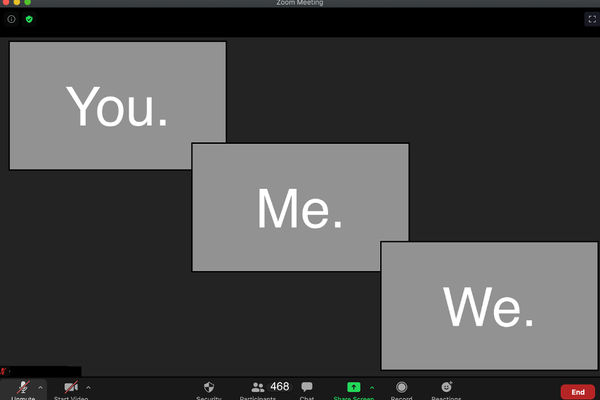On Aug. 27, four hundred and sixty freshmen tuned into the You. Me. We. Zoom orientation session. You. Me. We. serves as a diversity and inclusion training session which introduces first-year students to modern professional environments through skits. The session began with an introduction of three stage actors: a white man, a white woman and an African American man.
The first scripted conversation criticized the Black Lives Matter movement through an argument between the white and black actors. The proctor then paused the scene and opened the Zoom chat for discussion. This prompted an attendee to declare that “white people built America so we should be the ones to run it.” This was the first of many upsetting comments made by students in attendance. Other comments implied that an attendee did not believe the U.S.’s involvement in the genocide of Native Americans was real, and that rioting discredited the Black Lives Matter Movement.
Many students expressed their disappointment in these triggering comments. Freshman Kayla Moses pointed out, “This school has a history of blatant bigotry, and I expected it when I got here.” Moses further explained her frustration with a white male proctoring the session about social inequality, saying it made the conversation unsafe and unproductive. Freshman Kevin Carberry also commented on the interaction saying, “It gave racists and bigots a platform [and] a way to voice their hurtful opinions to our whole class.” Carberry noted, “The intention [of the Zoom meeting] may have been good, but it was handled in such a way that these people were able to hide behind a screen and spew hate.” Carberry shared that the comments made him feel sad, angry and quite frankly terrified that these hateful beliefs live on campus.
The second scripted discussion centered around the LGBTQ+ community. The scene focused on a young person being forced to come out as non-binary while being verbally attacked by their roommate. The conversation that followed caused the Zoom chat function to explode into chaos. One student loudly played ‘Mo Bamba’ by Sheck Wes over the speaker, while another student repeated, “there are only two genders.” This prompted a discussion about the validity of the transgender community after the proctor removed a student for saying, “it’s pretty self-explanatory, I was born with a **** between my legs.”
Some students in the chat were outraged over the claims made to invalidate the trans community, as there was little guidance from the proctor. Several students complained that every chat participant was able to speak freely over one another, which according to freshman Colby Feigenbaum “created a huge disarray and much of the conference was spent listening to students yell at each other, as well as shout closed-minded, offensive things.” Feigenbaum believes that the Zoom session served only to further divide students as opposed to its goal of unifying them through conversation.
Overall, the goal of the You. Me. We. program missed its mark and left many students in attendance unsatisfied and disturbed. There was little time to hear the thematic material over certain students’ hateful words. In response to the conference, freshman Isabella Horton remarked, “the lack of moderators or people to hold students accountable for the words said was so unexpected. There was no real teaching that went on.” Horton believes the Zoom session threw topics at the student attendees and expected that to simply educate them. Rather than the proctors or moderators minimizing interruptions, “we were the ones who had to hold our fellow students accountable [and] call them out for the misinformed and uneducated things they were saying,” claimed Horton. She concluded, “It was a burden to put onto these students, especially students of color and the LGBTQ+ community, to try and educate their peers.”
In response to the zoom misconduct, the Director of the Center for Inclusive Communities (CIC) Deborah Allen, told The Paladin that while the first incident involved an attendee using a pseudonym, the second incident was reported on the LiveSafe app and a bias incident report has since been submitted. She informed The Paladin, “Furman administration engaged in an open dialogue with the student about the impacts their comments made on their peers.” Additionally, Allen mentioned that the CIC is thinking deeply about this program moving forward and will not offer it in a virtual setting again. Acknowledging that the harm from this year’s program far outweighed the intended benefit, she emphasized the CIC’s number one priority is supporting students, particularly those who are the most marginalized on Furman’s campus.
Allen further recognized the comments were indeed hurtful and harmful toward Furman’s students of color, noting that “[administration] felt that it was important to both hold the student accountable while also using this as an opportunity to take an educational approach.” Allen also noted that the administration hopes the student can grow as a contributing member of our community who can participate in the thoughtful exchange of ideas with empathy and respect. She concluded, “We have much work to do at Furman in terms of cultivating an environment that is truly inclusive for our underrepresented community...[it] will take education, accountability and long-term systemic changes for us to make a lasting impact.’’
